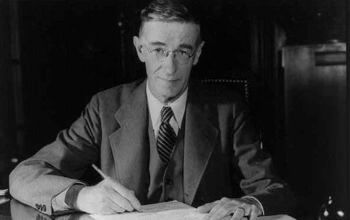Seventy years ago–on Nov. 17, 1944–President Franklin Delano Roosevelt wrote a letter asking how to further scientific research post-World War II. Addressed to Vannevar Bush, head of the Office of Scientific Research and Development (ORSD), the letter set forth questions that anticipated the vision for what would become the National Science Foundation (NSF).
Roosevelt wrote that he saw no reason why lessons learned from the ORSD, the wartime agency for science mobilization, could not be “profitably employed in times of peace.”
“New frontiers of the mind are before us, and if they are pioneered with the same vision, boldness, and drive with which we have waged this war we can create a fuller and more fruitful employment and a fuller and more fruitful life,” he wrote.
Roosevelt asked for Bush’s recommendations on four points, including how to publicly share ORSD’s discoveries, made under a blanket of war-induced secrecy, and how to build an effective program for “discovering and developing scientific talent in American youth.”
Bush’s reply, delivered six months later, was a smash hit among the scientific community, and paved the way for the creation of NSF.
“The pioneer spirit is still vigorous within this nation,” Bush wrote in his introduction to the report, titled Science–the Endless Frontier. “Science offers a largely unexplored hinterland for the pioneer who has the tools for his task. The rewards of such exploration both for the Nation and the individual are great. Scientific progress is one essential key to our security as a nation, to our better health, to more jobs, to a higher standard of living, and to our cultural progress.”
Bush outlined why scientific progress–and basic research–is essential, the role of universities and government in research and the importance of renewing scientific talent more. The full report is available here.


